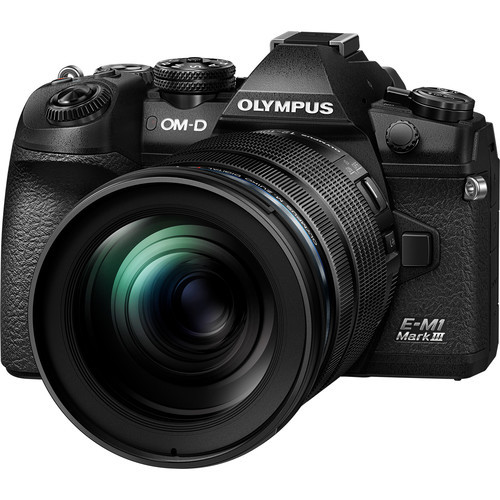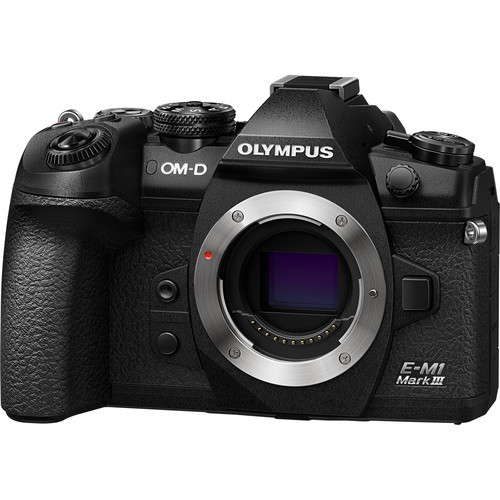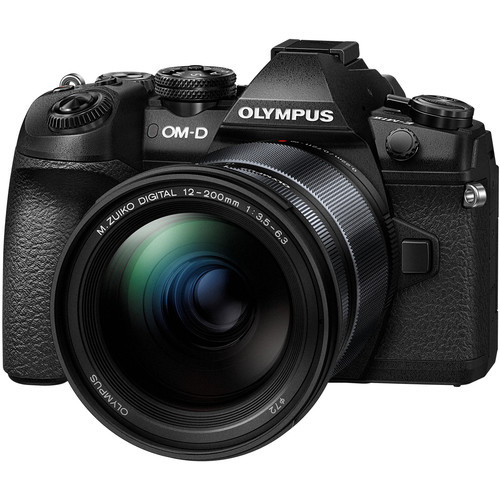A camera designed with speed, versatility, and portability in mind, the Olympus OM-D E-M1 Mark III is a well-rounded Micro Four Thirds mirrorless camera suitable for a variety of stills and video needs. Featuring a 20.4MP Live MOS sensor and an updated TruePic IX image processor, the camera is characterized by its quick continuous shooting, up to 60 fps with an electronic shutter and 15 fps with a mechanical shutter, as well as DCI and UHD 4K video recording. The sensor and processor also offer a sensitivity range up to ISO 25600 while a sophisticated 5-axis sensor-shift image stabilization system compensates for up to 7.5 stops of camera shake for sharper handheld shooting. Beyond imaging, the sensor's design also incorporates 121 on-chip phase-detection points, all of which are cross-type, along with 121 contrast-detection areas for fast and precise focusing and subject tracking performance.
In regard to the E-M1 III's physical design, it features a durable magnesium alloy body along with extensive weather-sealing to support working in harsh climates. Both a 2.36m-dot, 0.74x-magnification electronic viewfinder and 3.0" 1.037m-dot vari-angle LCD touchscreen are featured, too, for intuitive control and working from a variety of angles. Additionally, built-in Wi-Fi and Bluetooth further expand sharing and remote shooting capabilities, and dual SD card slots afford greater file saving flexibility.
20.4MP Live MOS Sensor and TruePic IX Image Processor
DCI and UHD 4K Video Recording and OM-Log
Benefitting recording in varying light conditions, an integrated OM-Log setting can be used to extend the effective dynamic range and afford a greater range of control during post-production color grading when used with the accompanying LUT file. Use of an external recording monitor is also possible, via HDMI output, which supports 4:2:2 8-bit color for a greater color correction range.
Additionally, a Time-lapse Movie mode is also available for recording up to 4K UHD resolution with a 5 fps shooting rate to highlight subject changes or movement over a longer period of time. Full HD and HD time-lapse settings are available, too, as well as a high-speed Full HD setting with 120 fps frame rate.
121-Point All Cross-Type Phase-Detection AF
Suiting portraiture, Face Priority and Eye Priority AF are also available to prioritize the face and eyes of your subject. And for working in low-light conditions, focusing sensitivity is available down to -3.5 EV, and a dedicated Starry Sky AF mode can be used for focusing on stars and other nighttime sky subjects. Converse to the autofocus capabilities, manual focus users are also benefitted by live view magnification and focus peaking controls for greater accuracy.
5-Axis Sensor-Shift Image Stabilization
Body Design and Connectivity
- High-resolution 2.36m-dot electronic viewfinder is available for eye-level monitoring, and it offers a high 0.74x maximum magnification for clear, distortion-free viewing.
- Rear 3.0" 1.037m-dot LCD monitor features a vari-angle design to support working from a variety of angles, and it is also a touchscreen for intuitive menu navigation and image playback. Additionally, an LV Boost mode can be used to optimize the screen's brightness and prioritize the frame rate when working in dark locations.
- Included BLH-1 rechargeable lithium-ion battery provides approximately 420 shots per charge with normal settings or up to an impressive 900 shots per charge with the quick sleep mode activated.
- The USB Type-C port can be used for quick in-camera battery charging.
- Built-in Wi-Fi and Bluetooth permits wireless image sharing and remote camera control from a linked smartphone or tablet when using the dedicated O.I.Share app for iOS and Android.
- Dual SD memory card slots offer improved flexibility for image storage, allowing you to segregate raw and JPEG files to different cards, save duplicate files to both cards, or simply double your storage space with overflow recording. Additionally, one of the card slots is UHS-II compatible for faster read/write speeds when used with a compatible UHS-II card.
- Wide accessory compatibility provided with the incorporation of 3.5mm headphone and microphone ports, a PC sync flash terminal and top hot shoe, USB Type-C and micro-HDMI ports, and a 2.5mm port for optional remotes.
- Rugged splash, dust, and freezeproof construction incorporates extensive sealing throughout the magnesium alloy body to accommodate working in harsh weather conditions and trying environments, even when a cable, microphone, or a set of headphones are attached.
- Supersonic Wave Filter and a dust-resistant coating are used to greatly reduce the likelihood of dust reaching the sensor.
- Durable shutter unit is rated to perform for over 400,000 actuations.
Shooting Modes
- Tripod High Res Shot mode offers the equivalent output of an 80MP image by combining eight sequentially recorded frames into a single, larger image. In between each of the exposures, the sensor-shift stabilization mechanism moves slightly in order to acquire more information than in a single exposure and these frames are then composited into a final image with greater resolution and color detail. The TruePic IX processor aids this process by compensating for any subject movement blur and this feature can also be configured to record 50MP or 25MP images for file size flexibility.
- Handheld High Res Shot mode, like the Tripod mode, produces a 50MP JPEG or raw file by compositing sequentially recorded files into a single image. The Handheld High Res Shot mode differs from the Tripod mode by recording 16 independent frames, opposed to eight, and the slight movement caused by hand-holding provides the range of movement needed to produce the larger final image.
- Simulating the effects of a neutral density filter, Live ND results in blurred subject movement by compositing exposures to replicate the look of a single image taken at a slower shutter speed. Particularly suitable for photographing moving water, five modes are available—ND2, ND4, ND8, ND16, and ND32—to vary how movement is portrayed.
- Live Composite is a unique long exposure mode that allows you to gradually build up an exposure over time without overexposing key elements within the frame. This mode works to only record newly detected light sources over time, and allows you to watch as an image develops, making it ideally suited for photographing star trails or other moving light sources.
- Live Bulb and Live Time settings can be used to produce creative long exposure imagery. Live Bulb lets you hold the shutter open for up to one minute and Live Time lets you press the shutter button once to open the shutter and then press again within a minute to end the exposure.
- Pro Capture Mode is a unique setting that starts recording and buffering full-resolution JPEG or raw images prior to fully depressing the shutter. As soon as you press the shutter button halfway, frames will begin to be recorded, and once you fully press the shutter, the image will be saved in addition to the previous 35 frames. Additionally, you can hold the shutter button in this mode to keep shooting continuously using the silent electronic shutter function.
- Interval shooting is supported for up to 9999 frames with 1 second to 24-hour exposure intervals.
- Anti-flicker shooting automatically detects the frequency/flicker of artificial lighting and activates the shutter at peak brightness moments to render exposures with consistent exposure and color.
- In-Camera Focus Stacking will automatically record eight images of a subject while shifting the plane of focus slightly, then composite these exposures into a single frame to exhibit an extended depth of field. Alternatively, Focus Bracketing allows you to record between 3-999 frames with adjustable focus steps in a 1-10 range for manual compositing during post-production. These modes are only available when working with M.Zuiko Digital ED 60mm f/2.8 Macro, 12-40mm f/2.8 PRO, 40-150mm f/2.8 PRO, 30mm f/3.5 Macro, 7-14mm f/2.8 PRO, 8mm f/1.8 Fisheye PRO, 300mm f/4 IS PRO, 12-100mm f/4 IS PRO, and 12-45mm f/4 PRO lenses, as well as the M.Zuiko Digital MC-14 1.4x and MC-20 2.0x Teleconverters.
- Keystone Compensation allows you to correct for convergence when working in live view. Similarly, Fisheye Compensation allows you to use the M.Zuiko Digital ED 8mm f/1.8 Fisheye PRO lens as a rectilinear wide-angle lens by correcting and eliminating distortion.















